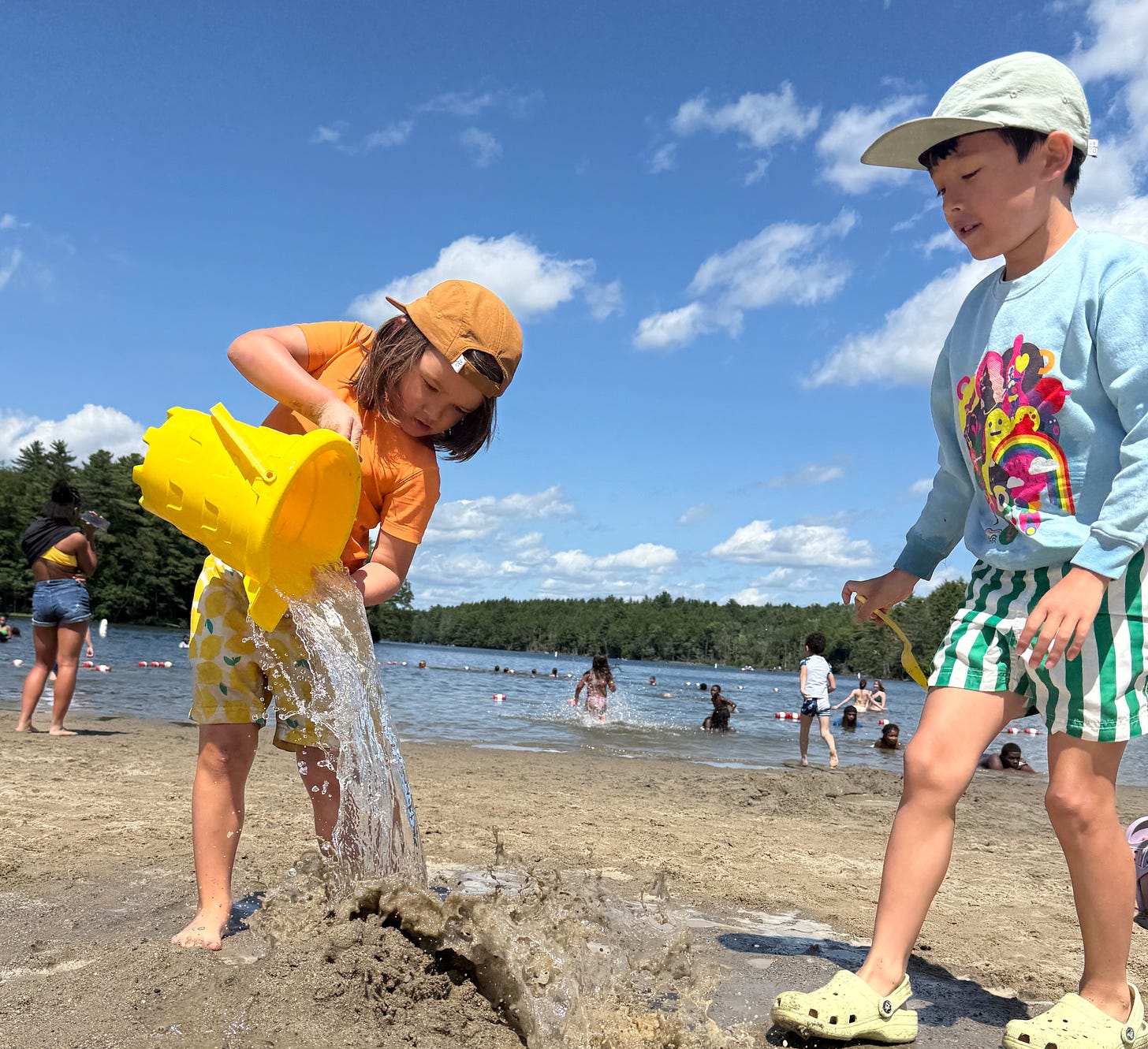Note: This is normally a Bonus Recs week for paying subscribers, but I wrote this yesterday, so will share the Bonus Recs I’d planned, “10 household objects I wholeheartedly endorse,” tomorrow. For access you can become a paid subscriber.
On Friday, I drive out of the city, listening to Careless People by Sarah Wynn-Williams on audiobook, about the often impulsive and heedless decisions of people in power during the early days of Facebook/Meta, as they’re increasingly gaining influence. They’re stumbling through decisions in ignorance, with little regard for the ripple effects, the harms.
I pass through blue-bird skies and coast up a sparsely trafficked Taconic Parkway to Grafton Lake State Park, where I meet my parents, younger brother, Julian, and my nephew Leo on the small beach, crowded with revelling families.
It’s the 4th of July and families are grilling; they are donning red, white, and blue. They are scantily clad, carrying more bags and beach toys than they can comfortably hold. They are dropping their flip flops. They are eating firecracker popsicles and the smoke is billowing up through the trees. There are hammocks strung up between trees, and sign that says “Happy Birthday America” that is hanging askew.
The water is calm with a few minnows darting here and there. Julian goes into the water with his bug-eyed mirrored goggles, finally a swimmer confident enough to be of his own volition for a half hour at a time. He works on his backflips. He work on his back floats. He works on his backstroke.
In the distance, you can rent rowboats and kayaks, and kids are jumping off the lifeguard chairs into heaps of sand. It’s what I think of as a very American beach scene: big bodies in bright colors eating preservative-laden foods from bags, everyone just trying to catch a breath on a day off from work.
Julian and Leo build a sand sculpture—really, just a giant mound, that they then proceed to destroy with buckets of water. They’re hauling the bucket—too full—spilling along the way. The beauty is in the destruction, the power of the water, and they cheer every time another turret goes down. They’re melting away every last part of the structure, every uneven hump, until the remains are almost indiscernible.
//
Along the Guadalupe, they say the youngest bunk of campers at Camp Mystic were “just feet from the banks of the river.” It’s this bunk, where so many of the girls have disappeared or perished, in the deadly floods that ravaged the Hill Country in the early mornings of July 4th.
I think of Ada, also at sleepaway camp for her first time, with a dozen or so new friends. 12 new people, with whom you suddenly cohabitate, dine with, play with, sing with, boat with, float through life with, for a few, intense, oxytocin-loading weeks.
The look of a camp photo, I have learned, from obsessively checking the app for updates, is the same everywhere. The children are full of spirit. They are always touching each other. They are gathered in the shape of a semi-circle. They have their arms wrapped around one another and they are laughing. They are rolling around in the grass and they are piled upon one another, two carrying one, playing sport, dressed up for theatre, performing, leading, cheering each other on.
They’re wearing each other’s star-spangled accessories. They’re wearing face paint and scrunchies. The older girls are all in skimpy bikinis. The younger girls still have cheeks and missing teeth. They have the look of being included and cared for.
When the app lets me know that new photos have been posted, I scan for Ada. There she is, with her bunkmates, none of whom I know, at all. In the group photo from the 4th of July, a few hours after the Guadalupe crested, she’s flopping her head of hair backwards, goofing to the camera, slightly askance from the core of the bunk.
In the background, the water of the lake is so calm, and they have no idea, of course.
//
When news outlets report on statements from families of those missing from the floods, a family member remarks that “prayers are needed so we can bring them home.” Hopes and prayers. “I ask the lord to take care of their soul.”
Matt Stieb, in an Intelligencer article titled, The Trump Administration Has Blinded Hurricane Forecasters writes,
Last week, the National Oceanic and Atmospheric Association announced that it would no longer provide information from military satellites that have been relied on heavily to determine a hurricane’s path. The satellites, which orbit the Earth’s poles, use microwaves to look inside the storm, offering experts important data on rapid intensification — the dangerous process of a hurricane growing in speed or size before making landfall, made more frequent by climate change. The change will take effect on July 31, just as the peak of hurricane season begins…”
“We Are Becoming Less Prepared to Fight the Next Disaster,” reads another headline in a piece written by MaryAnn Tierney, who has worked in emergency management for over 25 years, including with FEMA and the Department of Homeland Security.
“You’ll have more oceanfront property,” says Trump, in response to concerns about the climate.
It’s unknowable, to some degree, if more was knowable. It’s terrifying how much more will go unknown, the next time a river swells.
Ted Cruz tweets that he and his wife, Heidi will continue to “lift up in prayer the families of the victims.”
Meanwhile, a single member of the Coast Guard, a swimmer named Scott Ruskan, rescued 165 people from the floods. When asked about his heroic acts, he attributes no particular outside forces. “Honestly, I’m mostly just a dude,” he says. “The real heroes were the kids on the ground.”
Which people, actually care less?
You can donate to the Kerr County Flood Relief Fund here. For any paid subscriptions made today, I will match this amount in donations to the relief fund.







Thank you for writing about this. It's so incredibly sad.
I read the substack Emily In Your Phone and learned this “As reported by Kat Vargas, the Texas legislature recently took up and did not pass a bill “to improve Texas’ disaster response, including better alert systems, along with a grant program for counties to buy new emergency communication equipment and build new infrastructure like radio towers.” The state Rep. representing Kerrville, Wes Virdell, said he’s now reconsidering his vote against the bill.” https://emilyinyourphone.substack.com/p/texas-flood-victims-deserve-better?utm_campaign=posts-open-in-app&triedRedirect=true